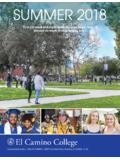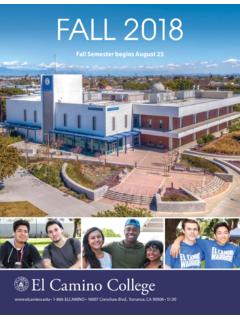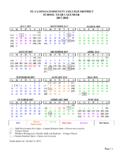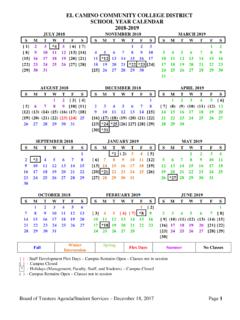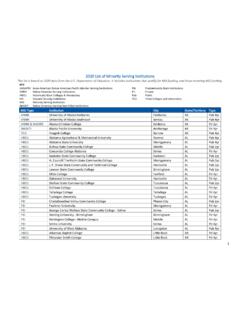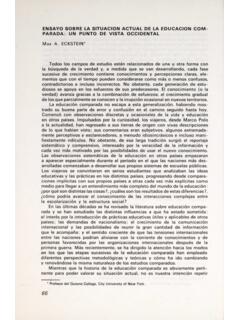Transcription of El Camino College Compton Center
1 Institutional Research 1 May 2016 JS El Camino College Compton Center Distance Education Student Survey Results Spring 2016 Introduction The Distance Education (DE) Student Survey was distributed to over 1,100 students enrolled in online classes in Spring 2016 at El Camino College and Compton Center . A total of 290 responses were received (25% response rate) from the electronic survey. The margin of error for survey responses is , with 95% confidence. This report only provides a summary of the main findings from the survey for students taking Compton Center online classes (N=74). Student Demographics Seventy-five percent of students that participated were female, which is on par with the overall DE female percentage, as published in the latest DE Report.
2 Male students participated at a rate 7% lower than their overall DE participation. The largest ethnic groups participating were Latino (43%) and African-American (41%) students. This is in accordance with the DE population. Twelve percent of the survey participants were Caucasian/White, even though only 5% of the DE population is. Students were mostly in the 25 to 30 years old age group (31%), followed by 15% in the 31 to 40 years old group. Distance education students at Compton were also likely to work 31 hours or more per week, accounting for over 50% of respondents. Over 53% of students have taken at least 3 online courses previously, the vast majority of which were at El Camino College or the Compton Center .
3 54% of students also reported that they took a hybrid course during the Spring 2016 semester. Hybrid Courses Due to the large number of students taking hybrid courses, the results of the survey were disaggregated into two reports (separate analysis not included). One report included students that took hybrid courses. The second included students that took fully online courses. However, few differences were noted. One key difference was that students that take hybrid courses are more likely to be younger and work fewer hours per week than students that were only taking fully online courses. This makes sense, since hybrid courses demand more on-campus time and provide less flexibility than online only courses.
4 This may attract more traditional (younger) or full time students. When students were asked how many other DE courses they had taken in the past, fully online students were more likely to have already taken 3 to 4 courses online. In contrast, more students taking hybrids courses were taking a DE course for the first time (25%). When answering items about the purpose of taking a DE course, 30% of hybrid students (as opposed to only 17% of fully online students), said it was to complete a degree or certificate. To Institutional Research 2 May 2016 JS further differentiate among the groups, 12% of fully online students were taking a DE course for job or career training purposes.
5 None of the hybrid course taking students chose this option. Twenty-eight percent of students that were taking fully online courses were less likely to take a course if it was only offered on-campus. Only 10% of hybrid course taking students said they would not take their DE course if it was only offered on-campus. Lastly, fully online students were less likely to consider taking hybrid courses (52%) than those that were already taking hybrid courses (92%). These items suggest that students taking fully online courses do not want to take on-campus courses, are older, and might be working on professional development for their careers. They may have more stringent schedules that do not allow them to be on-campus, even for a hybrid course.
6 Opinions About Online Instruction Students were asked a variety of questions about online instruction. The top reasons for taking courses online were the flexibility/convenience and ease of coordinating with work or family commitments. Only about 8% of students cited living far from campus as a motivator to take online classes. Most participants felt that the online course workload was heavier (32%) or about the same (51%) as in their face-to-face classes. This suggests that online courses are as rigorous as their on-campus equivalents. The vast majority of respondents agreed that they are learning as well online as on-campus, with 52% completely agreeing and 25% somewhat agreeing.
7 Interest in Future Online Opportunities Several items asked students about their interest in online offerings. The likelihood of taking another course online is high (88%). Moreover, 69% of students reported they would be somewhat likely or very likely to take a hybrid course in the future. Those who would not be likely to return to the online environment said they preferred face-to-face instruction (13%). Thirty-two percent indicated their reason for no longer taking DE courses would be that they are done with their coursework. These results are promising because they indicate that students are willing to enroll in more DE courses throughout their academic paths.
8 Seventy-nine percent of respondents expressed at least some interest in working completely online to receive their degree. Online Support Services When asked if they discussed the pros and cons of online classes with others before enrolling, 36% of respondents did so. However, when asked to elaborate on who was consulted, most stated it was family or friends (20%). Just over half (51%) found the Online Student Handbook helpful but 30% of students either did not consult or were not aware of the handbook. Similar results were found when asked about the Distance Education webpage. Among the student Institutional Research 3 May 2016 JS support services available online, 32% utilized the catalog or other course information, 33% accessed financial aid services, 20% accessed academic counseling, and 15% accessed the online library reserves.
9 When asked about when it would be most convenient for them to access academic counseling or tutoring online, most students indicated 12:00pm 6:00pm or 6:00pm 9:00pm would work best. However, 28% of students stated they would not use academic counseling. Similarly, 33% said they would not utilize the tutoring service. No comparable figures are available for non-DE students. Conclusion Overall, students are satisfied with their DE courses. There are a few expected differences between students taking hybrid courses and those that take fully online courses. The majority of students that take DE courses are not taking advantage of the online services offered, which suggests that there is a need for proactive measures to increase awareness and usage.
10 The survey results for the Compton Center , along with respondent comments, are attached below. ResponseFrequencyPercentResponseFrequenc yPercent2. In which type of distance education (DE) course(s)are you currently enrolled at ECC? (check all thatapply)1. Which of the following statements describe you?(check all that apply)Mean: -Mean: -I am attendingEl Online am attendingEl weeklymeetings oncampus am am enrolled ata Where were these online courses taken? (check allthat apply)3. How many courses have you previously takenonline at any College ?Mean: : -This is my to 2 courses to 4 courses or Education Student Survey ComptonN=74 Spring 2016 Distance Education Student SurveyComptonApril 2016 Institutional ResearchResponseFrequencyPercentResponse FrequencyPercent6.

